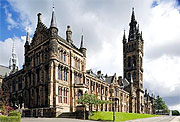Source:
Notable People
Sir Robert Geoffrey Edwards
Biologist
Born 27 September 1925.
Died 10 April 2013.
A Nobel prize-winning biologist who pioneered in vitro fertilisation.
Connection to the University of Glasgow: Researcher
Discover more biologists on the University of Glasgow Story website
Achievements
The following achievement is associated with Sir Robert Geoffrey Edwards:
Developing in vitro fertilisation
Robert Edwards and Patrick Steptoe developed the IVF technique for the fertilisation of human egg cells outside the body which led to te world's first test-tube baby in July 1978.
Honours
The following honours are associated with this person:
Biography
Robert Geoffrey Edwards is a Nobel Prizewinning biologist and pioneer of invitro-fertilisation. He was a Research Fellow in the University's Department of Biochemistry in 1962-3 and published a number of research papers with this affiliation.
Edwards began work on fertilisation in 1955, and forged his research partnership with gynaecologist surgeon Dr Patrick Steptoe in 1968. Although the first successful human test-tube fertilisation took place by 1970, research did not result in a successful pregnancy for another eight years. By the late 1970s, funding for Steptoe and Edwards' project was running out, and their work met with scepticism, resistance and set-backs. But in 1978, a breakthrough resulted in a healthy pregnancy and the birth of the first ever 'test tube baby', Louise Brown.
Edwards and Steptoe went on to establish the first IVF clinic at Bourn Hall, Cambridge, in 1980. Before Dr Steptoe died in 1988, Edwards, now a Professor of Human Reproduction at Cambridge, was able to tell his seriously ill colleague that one thousand babies had been conceived at the clinic.
Professor Edwards has a living legacy to his work with over four million children born as a result of IVF.
Receiving many honours for his pioneering work, he received the Nobel Prize for Medicine in 2010. At the announcement of the award it was stated that "His achievements have made it possible to treat infertility, a medical condition afflicting a large proportion of humanity including more than 10% of all couples worldwide."


